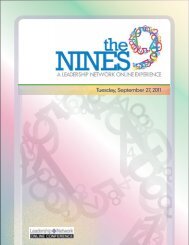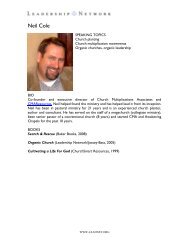ARE WE A PEOPLE AT HALF TIME? - Leadership Network
ARE WE A PEOPLE AT HALF TIME? - Leadership Network
ARE WE A PEOPLE AT HALF TIME? - Leadership Network
You also want an ePaper? Increase the reach of your titles
YUMPU automatically turns print PDFs into web optimized ePapers that Google loves.
members of church ministry teams to work<br />
together. I have heard some argue that<br />
covenants, whether verbal or in writing, are<br />
not needed. In my experience, however, and<br />
that of many others, healthy, team-like conduct<br />
is not readily practiced on church staffs<br />
and other ministry groups. The intent to live<br />
the Gospel in relationships can be present, but<br />
the actual doing of it falters. In most cases,<br />
teams have relational problems not because<br />
of a single culprit acting intentionally but<br />
because of the dysfunctional behavior that<br />
goes unrecognized and unaddressed.<br />
Covenants help solve this problem by giving<br />
team members standards of good group<br />
behavior and relationships.<br />
THE VISIONARY TEAM<br />
Scripture reveals the activity of God as Father,<br />
Son and Holy Spirit moving and acting in our<br />
midst with a clear purpose. Effective ministry<br />
teams are those that cast a vision that unites<br />
people around a God-given cause. Visionary<br />
teams are motivated by a strong sense of mission<br />
and purpose. They know where they are<br />
going and work to align their energy and<br />
effort toward fulfilling their divinely inspired<br />
purpose. They sense that their work has ultimate<br />
meaning. They sense that they are proceeding<br />
to do something highly significant,<br />
and they are clear about what each team<br />
member’s role is in accomplishing the objective.<br />
The vision is like a drawstring that pulls<br />
the organization together and focuses it on its<br />
particular mission. The energy, spiritual gifts,<br />
resources and organizational structure of the<br />
church are aligned with the vision.<br />
www.leadnet.org<br />
THE CULTURE-CRE<strong>AT</strong>ING<br />
TEAM<br />
The community of the Father, Son and Holy<br />
Spirit is a culture of love. God calls the<br />
Church of Jesus Christ to exhibit the Kingdom<br />
of God to the world. We are to be culture creators.<br />
It might even be more accurate to say<br />
we are enabled by God to be counterculture<br />
creators.<br />
The postmodern world is full of culture creators.<br />
Ministry teams endeavor to create the<br />
culture of the perichoretic fellowship of God.<br />
In doing so they, and thus their churches,<br />
offer an alternative to the destructive and dysfunctional<br />
cultures around us. The team-created<br />
culture that is specific to the vision for<br />
the church’s ministry becomes the basis for<br />
the congregation’s culture as well. The leadership<br />
team immerses itself in a culture it then<br />
cultivates within the congregation. When we<br />
build a strong team and church culture, we<br />
will attract those who resonate with the mission<br />
supported by that culture. Creating<br />
Christian culture means developing the symbols,<br />
themes, activities, values and structures<br />
that reinforce the faith and purpose of a given<br />
congregation. Ministry teams that make a difference<br />
are inspired and equipped by God to<br />
shape this culture.<br />
THE COLLABOR<strong>AT</strong>IVE TEAM<br />
There is no competition among the persons of<br />
God. The idea that the Son would work<br />
against the ministry of the Spirit is entirely<br />
incongruous with the nature of God. That the<br />
Father would be jealous of the Son is absurd.<br />
There is, in the nature of God, what we might<br />
call perfect collaboration.<br />
Team ministry has a solid biblical and theological<br />
foundation that, in most cases, sets it<br />
above Lone Ranger heroics as the most meaningful<br />
way to serve in the church. A team that<br />
learns how to discern<br />
the spiritual gifts of the<br />
individual team members<br />
and have members<br />
work together,<br />
pray hard, share information<br />
and energy in<br />
order to move toward a sharply defined mission,<br />
vision, or cause is an extremely powerful<br />
unit of ministry.<br />
Collaboration is not uniformity. Collaboration<br />
is coming to the table with spiritual gifts to be<br />
used in ministry. When the gifts are freely<br />
offered for ministry, God blesses and creates<br />
the spiritual synergy resulting from the team<br />
members’ collaboration. Collaboration works<br />
against competition. Collaboration is the art<br />
and skill of negotiating community, networking<br />
gifts, and focusing individual contributions<br />
to fit into the larger movement of the faithful<br />
fellowship.<br />
THE TRUSTING TEAM<br />
God exudes trust. The perfect community of<br />
the Trinity implies perfect trust. There is no<br />
sense that the Son betrays the Father or the<br />
Spirit lies and is deceitful. Scripture instead<br />
reveals that God keeps His promises, creates<br />
and holds to covenants, and establishes trust.<br />
Church leadership teams must model trust.<br />
They must work to keep it. When it is lost,<br />
they must work to regain it. Churches, like<br />
people, thrive and blossom in environments of<br />
trust and become ugly and schismatic when<br />
overwhelmed by distrust. The ways a church<br />
leadership team builds and retains trust<br />
among its members and exhibits trust to the<br />
church at large will determine, in a large part,<br />
how well trust becomes a part of the total<br />
0<br />
6<br />
fabric of the congregation. When we discuss<br />
trust, we deal with the greatest possibilities —<br />
and the greatest threats—for leadership<br />
teams and congregations.<br />
THE EMPO<strong>WE</strong>RING TEAM<br />
Perichoretic leadership lifts up the responsibilities<br />
of others rather than taking responsibility<br />
away. Ministry team members take<br />
appropriate risks to innovate and surrender<br />
their responsibility in order to empower others.<br />
Their task is to empower others so that<br />
they may learn and grow and be all that God<br />
calls them to be.<br />
Effective ministry teams in the postmodern era<br />
are empowering teams. They have put aside<br />
the older, hierarchical models and spread out<br />
the authority and responsibility of doing ministry.<br />
<strong>Leadership</strong> no longer means taking control,<br />
dictating or giving orders. Gone also are<br />
the more subtle<br />
forms of controlling,<br />
such as using<br />
theological degrees<br />
to lift oneself above<br />
others with the<br />
implication that<br />
“clergy know best.” Because of the strong<br />
biblical support for the ministry of the people,<br />
those theologically trained find it their responsibility<br />
to emphasize the growth and development<br />
of the people of the church into<br />
ministers of the Gospel.<br />
One of the marks of highly innovative and lifefilled<br />
churches today is the giving away of<br />
ministry to the people in ways that resemble<br />
the ministry of the early church. Clerics in<br />
these churches function as coaches, giving<br />
advice to, equipping, training and encouraging<br />
those in the front lines of ministry: the<br />
people. These teams reinforce the concept<br />
that there is no such thing as a passive<br />
Christian; all of us are called to mission and<br />
ministry. Empowering teams build strong,<br />
enduring churches because the responsibility<br />
for the mission of the church is widely shared.<br />
Make team building more<br />
than a technique—<br />
make it a lifestyle.<br />
THE LEARNING TEAM<br />
Effective ministry teams are ever-growing and<br />
open to new discoveries. They have an insatiable<br />
appetite to learn. The learning team is<br />
not satisfied with its present state but seeks to<br />
grow spiritually and to know more about<br />
doing ministry in more effective and meaningful<br />
ways. From trial and error, learning teams<br />
build a depository of learnings that help them<br />
be more effective in ministry. They take risks<br />
in innovation. They allow for failure because<br />
they know that failure is a form of learning<br />
and growing. ■







